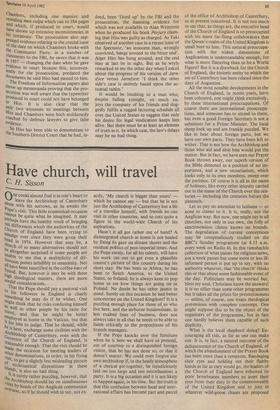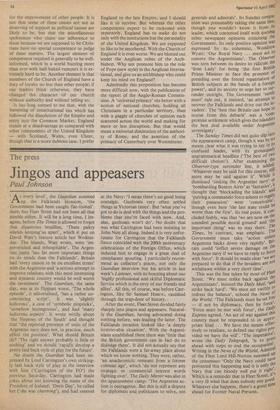Have church, will travel
C. H. Sisson One could almost find it in one's heart to leave the Archbishop of Canterbury alone with his sorrows, as he awaits the Pope's visit. This little ecumenical occasion cannot be quite what he imagined. It may Perhaps have the healthy result of bringing out differences which the authorities of the Church of England have been trying to smudge ever since they were given their head in 1974. However that may be, a church of so many alternatives should not be altogether surprised if some people are unable to see that a multiplicity of dif- ferences points infallibly to unanimity. Not all have been sanctified in the coffee-bars of sJnod. But, however it may be with these high theological matters, there are more sordid considerations. That the Pope should pay a pastoral visit to his followers in England is clearly something he may do if he wishes. One Might think that he risks confusing himself as well as other people by his taste for travel, and that he might be better en1Ployed at home in the Vatican, but that is for him to judge. That he should, while he Is here, exchange some civilities with the Archbishop of Canterbury, even with the `-'°verrior of the Church of England, is reasonable enough. That the visit should be Made the occasion for meeting leaders of sother denominations, in order, in his flying r, to get a slightly less misleading picture ov i ecclesiastical dispositions in these stands, is also no bad thing. _ It is surely rather puzzling, however, that the Archbishop should lay on simultaneous visits by heads of the Anglican communion overseas, as if he should wish to say, not ex-
actly, 'My church is bigger than yours' — which he cannot say — but that he is not just the Archbishop of Canterbury but a bit of a traveller himself, with friends he can visit in other countries, and so cuts quite a figure in the world-wide Church of his aspirations.
Hasn't it all got rather out of hand? A disintegrated church at home is not healed by fixing its gaze on distant shores and the residual politics of post-imperial times. And the Pope surely, for all his talents, will have his work cut out to get even a plausible tourist's picture of this country during his short stay. He has been to Africa, he has been to South America, to the United States, to Ireland; he is always keen to pop home to see how things are going on in Poland. No doubt he has other jaunts in mind. Surely on this occasion he had better concentrate on the United Kingdom? It is a puzzling enough place for those ocus who live here, and the airborne businessman, in less exalted lines of business, does not always take in all that he needs to be able to listen critically to the propositions of his branch managers.
If the Pope knocks over the furniture when he is here we shall have to pretend, out of courtesy to a distinguished foreign visitor, that he has not done so, or that it doesn't matter. We could even forgive our own archbishop if, in the heady atmosphere of a clerical get-together, he injudiciously laid on too large and too miscellaneous a party. It is a big occasion and it is not likely to happen again, in his time. But the truth is that this confusion between local and inter- national affairs has become part and parcel of the office of Archbishop of Canterbury, as at present conceived. It is not too much to say that, as things are, the executive head of the Church of England is so preoccupied with his more far-flung collaborators that the Queen's realm of the United Kingdom is small beer to him. This natural preoccupa- tion with the widest dimensions of Anglicanism is understandable enough, for what is more flattering than to be a World Figure? But it is a drawback for the Church of England, the historic entity to which the see of Canterbury has been related since the days of Augustine.
All the most notable developments in the Church of England, in recent years, have been coloured, one might, think excessively, by these international preoccupations. Of course there are international preoccupa- tions, and someone has to attend to them, but even a good Foreign Secretary is not a substitute for a Prime Minister. The local sheep look up and are frankly puzzled. We like to hear about foreign parts, but we have our own parts. They have been left to wither. That is not how the Archbishop and those who aid and abet him would put the matter. But in fact, we have seen our Prayer Book thrown away, our superb version of the Bible demoted to a position of no im- portance, and a new sectarianism, which looks only to its own members, sweep over the parishes. Of course it is all in the name of holiness, like every other iniquity carried out in the name of the Church over the cen- turies — including the centuries before the sixteenth.
Let us pay no attention to holiness — or none to claims to it. It is, really, not the Anglican way. But now, one might say in all churches, not only in our own, the folly of sanctimonious claims knows no bounds. The degradation of current conceptions may be compendiously studied on the BBC's Sunday programme (at 8.15 a.m. every week on Radio 4). In this ramshackle collection of what passes for religious news, not a week passes but some more or less ill- informed person is put up to say, with no authority whatever, that 'the church' thinks this or that about some fashionable event of the day. Politicians may be worried but, bless my soul, Christians know the answers! It is no sillier than some other programmes but it takes all the prizes for pretentiousness — unless, of course, one treats theological pretensions with complete contempt. One might suppose this to be the object of the organisers of the programme, but in fact one hardly believes them capable of such duplicity.
What is the local shepherd doing? En- couraging all this, as far as one can make out. It is, in fact, a natural outcome of the deliquescence of the Church of England, of which the abandonment of the Prayer Book has been more than a symptom. Bandaging their eyes and holding out their flabby hands as far as they would go, the leaders of the Church of England have exhorted its poor browbeaten members to avert their eyes from their duty in the commonwealth of the United Kingdom and to join in whatever wild-goose chases are proposed for the improvement of other people. It is not that some of these causes are not as deserving of support as political causes are likely to be, but that the miscellaneous spokesmen who claim our adherence to them because we are supposed to be Chris- tians have no special competence to judge of these matters. The largest element of competence required is generally to be well- informed, which in a world buzzing more than ever with half-baked rumours it is ex- tremely hard to be. Another element is that members of the Church of England have a duty of loyalty no less than other people; if our leaders think otherwise, they have changed the character of our church without authority and without telling us.
It has long seemed to me that, with the loosening of constitutional ties which has followed the dissolution of the Empire and entry into the Common Market, England stands at a disadvantage as compared with other components of the United Kingdom — with Scotland, Wales, even Ulster, though that is a more dubious case. I prefer England to the late Empire, and I should like it to survive. But whereas the other components expect to be reckoned with separately, England has to make do not only with the institutions but the personality of the United Kingdom. We are supposed to like to be smothered. With the Church of England it is even worse. We are blotted out under the Anglican robes of the Arch- bishop. Why not promote him to the role of Pope (new style) in the Anglican Interna- tional, and give us an archbishop who could keep his mind on England?
Admittedly this proposition has become more difficult now, with the publication of the report of the Anglo-Roman Commis- sion. A 'universal primacy' sits better with a notion of national churches, holding all Christians in a particular territory, than with a gaggle of churches of opinion each scattered across the world and making for more or less disruption. But that would mean a universal diminution of the authori- ty of Rome, and the assertion of the primacy of Canterbury over Westminster.



































 Previous page
Previous page